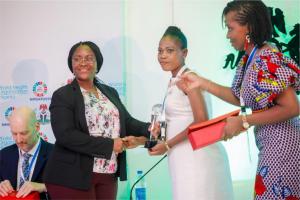WHO and Nigerian Government move to curb cardiovascular diseases
Abuja, October 7, 2019 - “My life has not been the same. Had it been I knew how awful it is to have a stroke, I would have been more cautious and protective of my health. I have lost my job and have not been able to secure another one all because I don’t walk and look like I used to. I also get rejected everywhere I show up for an interview”, says Ms. Oninye Iromba, a 34-year-old from Abia state who had stroke at the age of 30.
“It all started in 2015, when I woke up to ease myself around 3am in the morning and I just couldn’t move. I tried all possible ways but it seemed impossible, the best I could do was to make a phone call and seek for help. I was rushed to the hospital and after 8 hours of running tests, the doctors confirmed I had a stroke due to high blood pressure, which I never knew I had.”
Just like Onyinye’s case, Non Communicable Diseases (NCD)—mainly cardiovascular diseases, cancers, chronic respiratory diseases, diabetes and Mental Health Disorders—are the world’s biggest killers and have now been termed “a silent epidemic”.
These diseases share common risk factors namely; tobacco use, harmful use of alcohol, unhealthy diet, physical inactivity and air pollution. More than 36 million people die annually from NCDs accounting for 63% of all global deaths. And this includes more than 14 million people who die too young between the ages of 30 and 70. Low- and middle-income countries unfortunately, already bear 86% of the burden of these premature deaths giving rise to estimated cumulative economic losses of US$7 trillion over the next 15 years and entrapment of millions of people trapped in poverty except we turn the tide by putting in place interventions.
Among these diseases, Cardiovascular diseases (CVDs) are the number 1 cause of death accounting for 17.5 million deaths annually with high blood pressure being the leading risk factor. CVD’s are disorders of the heart plus blood vessels and they include coronary heart disease, cerebrovascular disease, rheumatic heart disease and other conditions. Four out of five CVD deaths are due to heart attacks and strokes.
According to Dr. Nnenna Ezeigwe, the National Coordinator for NCD’s in the Federal Ministry of Health (FMoH ), “CVD is a significant public health concern responsible for 11% of over 2 million NCD deaths in Nigeria annually. It is also responsible for a high burden of morbidity and disability. Most people with CVDs are not aware until catastrophes like stroke, heart attack or death occur.”
“The economic burden of NCD’s on families and Nigeria in general is significant because the cost of treatment is high, usually paid out of pocket and death is mostly premature, cutting victims at their prime of productivity.” She added.
CVD’s are both preventable and reversible when identified early. Prevention can be accompanied by addressing the risk factors of tobacco use, unhealthy diet, obesity, physical inactivity and harmful use of alcohol. They can be treated if people with the disease or at high risk due to having hypertension, diabetes or hyperlipidemia are identified early with their conditions appropriately managed.
The Nigerian government is deeply concerned and is taking measures to tackle the risk factors responsible through the implementation of the National Tobacco Control Act (NTC Act) 2015, promotion of physical activities and healthy diet among the populace. Government has also prioritized Universal Health Coverage to ensure families are not pushed into poverty in the event of CVD or other health conditions. The FMoH is also taking steps to integrate WHO recommended Package of Essential NCD interventions (WHOPEN) into Primary Health Care (PHC) as well as engaging other relevant sectors through the National Multi-sectoral Action Plan on NCDs (NMSAP) launched in August 2019 to provide enabling environment for healthy hearts of Nigerians. An initiative to strengthen the management of hypertension at the PHC is also being piloted in Kano and Ogun states through the Resolve to Save Lives Program.
Technical contacts
Dr Mary Dewan; Email: dewanm [at] who.int (dewanm[at]who[dot]int); Tel: +234 903 590 0750
Hafsat Danmaisoro; Email: danmaisoroh [at] who.int (danmaisoroh[at]who[dot]int); Tel: +234 906 297 8503




